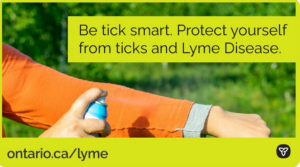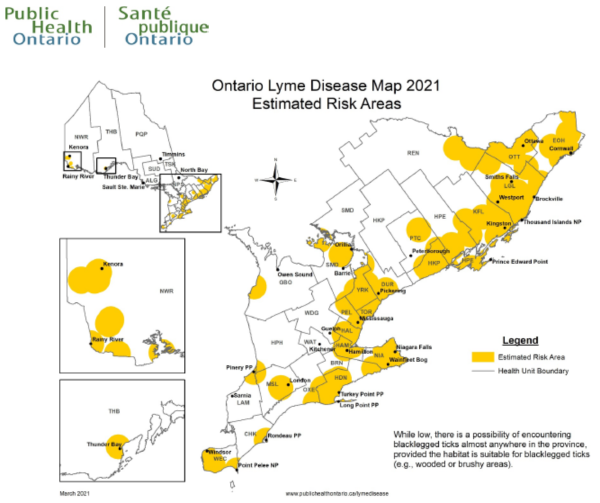Although Wawa is not an estimated risk area, there is also the possibility that Wawaites may travel to an afflicted area (as COVID restrictions continue to lift) and should take all precautions against tick and Lyme Disease.
 As the weather is getting warmer, the Government of Ontario is reminding everyone to take the necessary precautions when spending time outdoors to prevent tick bites and reduce the risk of Lyme disease.
As the weather is getting warmer, the Government of Ontario is reminding everyone to take the necessary precautions when spending time outdoors to prevent tick bites and reduce the risk of Lyme disease.
Lyme disease is a potentially serious infection that comes from being bitten by an infected blacklegged tick. Infected ticks can be found almost anywhere in Ontario, particularly in wooded areas or areas with tall grasses and bushes, including city gardens and parks.
“Now that warmer weather is finally here, we want to ensure Ontarians know how to protect themselves from Lyme disease and other tick-borne illnesses,” said Christine Elliott, Deputy Premier and Minister of Health. “The areas where ticks can be found are spreading, and as a result, more Ontarians are at a greater risk of getting a tick bite. By taking simple precautions, you can protect yourself and your family so that we can all enjoy the outdoors safely.”
When spending time outdoors, you can protect yourself from tick bites by:
- Wearing light-coloured clothing so it’s easier to spot ticks.
- Wearing long-sleeved shirts, long pants tucked into your socks, and closed-toed shoes.
- Using an insect repellent with DEET or icaridin in it, which is effective and safe when applied as directed on the label.
- Staying on marked trails.
- Checking yourself, your children, and your pets after being outdoors and removing any ticks promptly, and washing your clothes after an outdoor activity.
“Lyme disease is preventable and can be treated successfully if the necessary precautions are taken,” said Dr. David Williams, Chief Medical Officer of Ontario. “While ticks are most active in the spring and summer months, they can also be found during the fall when temperatures are still above freezing. I encourage everyone to follow these simple steps year-round to protect yourself and your families.”
Blacklegged ticks are small and hard to see. If you find ticks on your body, remove them immediately with tweezers and clean the area with soap and water. If you have any symptoms or health concerns after a tick bite, consult a health care provider as soon as possible. If caught early, most cases of Lyme disease can be treated successfully with antibiotics.
While outdoor activities can help improve physical fitness and mental wellness, they are not risk-free and COVID-19 transmission can occur as a result of outdoor gatherings. It remains critical that Ontarians continue following public health measures to reduce transmission of the virus, protect hospital and public health capacity, and save lives.
- Ontario Fast-Tracks Kinross Gold’s Great Bear Project Under ‘One Project, One Process’ - February 17, 2026
- Ontario and Marten Falls First Nation Sign Historic Agreement to Unlock Ring of Fire - November 28, 2025
- Ontario Investing in Winter Roads Network - November 25, 2025
 Wawa-news.com Local and Regional News
Wawa-news.com Local and Regional News


